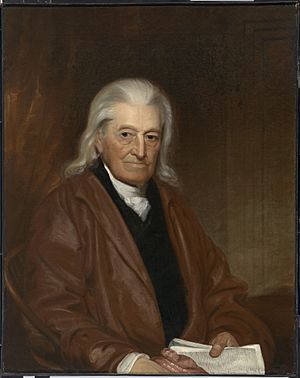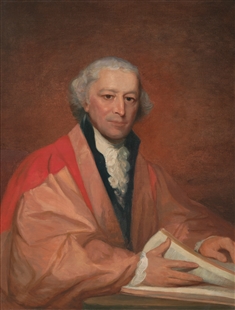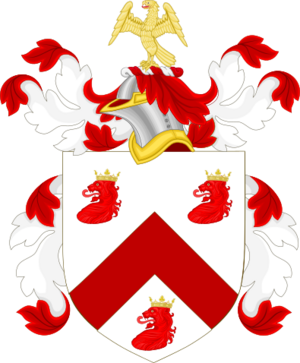William Samuel Johnson facts for kids
Quick facts for kids
William Samuel Johnson
|
|
|---|---|

Portrait by John Wesley Jarvis, between 1809 and 1819
|
|
| United States Senator from Connecticut |
|
| In office March 4, 1789 – March 3, 1791 |
|
| Preceded by | Office created |
| Succeeded by | Roger Sherman |
| 3rd President of Columbia University | |
| In office 1787–1800 |
|
| Preceded by | George Clinton (acting) |
| Succeeded by | Charles Henry Wharton |
| Personal details | |
| Born | October 7, 1727 Stratford, Province of Connecticut, British America |
| Died | November 14, 1819 (aged 92) Stratford, Connecticut, U.S. |
| Resting place | Christ Episcopal Church Cemetery, Stratford |
| Nationality | American |
| Political party | Pro-Administration |
| Spouse | Anne Beach |
| Children | Elizabeth Johnson |
| Parents | Samuel Johnson Charity Floyd Nicoll |
| Relatives | Daniel Verplanck (son-in-law) Gulian C. Verplanck (grandson) |
| Alma mater | Yale College |
| Profession | Politician, clergyman |
| Military service | |
| Branch/service | Connecticut Colonial Militia |
| Rank | Colonel |
William Samuel Johnson (born October 7, 1727 – died November 14, 1819) was an important American leader. He is known as one of the Founding Fathers. This means he played a key role in creating the United States.
Before the Revolutionary War, he was a military officer. He later signed the U.S. Constitution. He also represented Connecticut in the United States Senate. For many years, he was the president of King's College, which is now Columbia University.
Contents
Early Life and Education
William Samuel Johnson was born in Stratford, Connecticut. His birthday was October 7, 1727. His father, Samuel Johnson, was a well-known church leader. He also helped start King's College. William learned a lot at home when he was young.
He then went to Yale College and graduated in 1744. He earned a master's degree from Yale in 1747. He also received an honorary degree from Harvard University that same year.
A Career in Law and Politics
William's father wanted him to become a church leader. But William chose to study law instead. He taught himself about law and quickly became a successful lawyer. He made many important business friends.
He also served in Connecticut's local military for over 20 years. He rose to the rank of colonel. He was a member of the Connecticut Legislature several times. He also served as a judge on Connecticut's highest court.
Johnson first became interested in the Patriot cause because of new British laws. He and others felt that the British Parliament was unfairly controlling the colonies. In 1765, he attended the Stamp Act Congress. This meeting protested a new tax on paper goods. He argued that the colonies should decide their own taxes. He also opposed the Townshend Acts. These laws taxed goods like tea and glass. He supported agreements to stop buying British goods. This was a way to protest "taxation without representation."
During the American Revolution

From 1767 to 1771, Johnson lived in London, England. He worked there to help Connecticut with land issues. He often spoke out against Britain's policies toward the colonies. His time in Britain helped him understand why Britain made certain decisions. He realized that British leaders often didn't know much about life in America.
As American Patriots became more extreme, Johnson found it hard to fully support them. He believed British policies were unwise. But he also had strong ties to Britain. He had many friends there and among American Loyalists. He was also connected to the Anglican Church in England. He had friends at Oxford University, which gave him an honorary degree.
Johnson worried about what independence would mean for both America and Britain. He tried to find a middle ground. He wanted to avoid extreme actions and find a compromise. He refused to join the First Continental Congress. This made some Patriots upset. They even removed him from his military command. He was also criticized for trying to stop the fighting after the Battles of Lexington and Concord. He visited the British commander, General Thomas Gage. This led to his arrest for talking to the enemy. However, the charges were later dropped. Johnson felt that the American Revolution was not needed. He thought independence would be bad for everyone.
Building a New Nation
After America won its independence, Johnson felt ready to help the new country. He served in the Congress of the Confederation from 1785 to 1787. Other leaders recognized his influence. One friend wrote that Johnson had "much more influence" than others. In 1785, the Vermont Republic named a town after him. This was to thank him for helping Vermont in Congress. The town of Johnson, Vermont, and Johnson Street in Madison, Wisconsin are named for him.
The Constitutional Convention
In 1787, Johnson played a big part in the Philadelphia Convention. This meeting created the U.S. Constitution. He gave powerful speeches about how states should be represented. He wanted a strong national government. This government would protect smaller states like Connecticut. He supported the New Jersey Plan. This plan called for all states to have equal votes in the national legislature.
Johnson believed the national government should have more power. He argued that courts should handle both legal and fairness issues. He also said that treason could only be against the whole country, not just one state. He was against banning "ex post facto laws." These are laws that punish someone for something that was not illegal when they did it. He felt banning them showed too much suspicion of the new government.
Johnson was important even at the very end of writing the Constitution. He strongly supported the Connecticut Compromise. This plan created two parts of Congress. The Senate would have equal votes for all states. The House of Representatives would have votes based on population. This compromise helped create the final Constitution. He also led the Committee of Style. This small group wrote the final words of the document.
Catherine Drinker Bowen, in her 1966 book Miracle at Philadelphia, praised Johnson. She called him "the perfect man to preside" over the other smart committee members. She said his calm manner was very helpful.
Images for kids
 | Sharif Bey |
 | Hale Woodruff |
 | Richmond Barthé |
 | Purvis Young |





